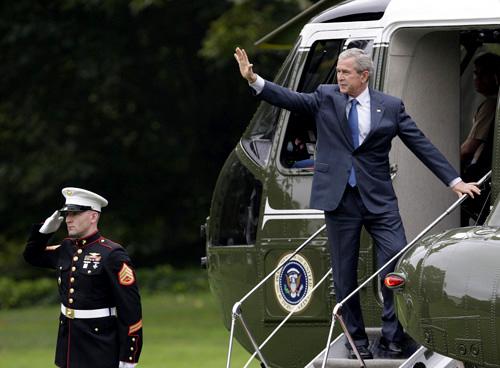Bush vetoes insurance expansion

President Bush waves from the steps of Marine One on Wednesday shortly after vetoing a bill that would have expanded a popular health care program for children by $35 billion. Bush was leaving for a day trip to Lancaster, Pa. THE ASSOCIATED PRESS, RON EDMONDS
Oct 4, 2007
Last updated on May 12, 2016 at 04:45 p.m.
WASHINGTON – President Bush cast a quiet veto Wednesday against a politically attractive expansion of children’s health insurance, triggering a struggle with the Democratic-controlled Congress certain to reverberate into the 2008 elections.
“Congress will fight hard to override President Bush’s heartless veto,” vowed Senate Majority Leader Harry Reid of Nevada.
Republican leaders expressed confidence they have enough votes to make the veto stick in the House, and not a single senior Democrat disputed them. A two-thirds majority in both houses of Congress is required to override a veto.
Bush vetoed the bill in private, absent the television cameras and other media coverage that normally attend even routine presidential actions. The measure called for adding an estimated four million mostly lower-income children to a program that currently covers 6.6 million. Funds for the expansion would come from higher tobacco taxes, including a 61-cent increase on a pack of cigarettes.
Get The Daily Illini in your inbox!
“Poor kids first,” Bush said later in explaining his decision, reflecting a concern that some of the bill’s benefits would go to families at higher incomes. “Secondly, I believe in private medicine, not the federal government running the health care system,” he added in remarks to an audience in Lancaster, Pa.
The president said he is willing to compromise with Congress “if they need a little more money in the bill to help us meet the objective of getting help for poor children.”
It was the fourth veto of Bush’s presidency, at a time his popularity is low, the legislation popular enough to draw support from dozens of GOP lawmakers, and an override certain to seal his lame-duck status.
Democratic leaders scheduled the showdown for Oct. 18 to allow two weeks for pressure to build on Republicans. A union-led organization said it would spend more than $3 million trying to influence the outcome. “It’s going to be a hard vote for Republicans,” promised Speaker Nancy Pelosi, D-Calif.
Criticism of the veto was instantaneous, from every quarter of the Democratic political firmament.
Sen. Joseph Biden of Delaware, a presidential hopeful, called it unconscionable, party chairman Howard Dean labeled it appalling, and Pelosi said, “It’s very sad that the president has chosen to veto a bill that would provide health care for ten million American children for the next five years.”
Republicans said none of the criticism would matter. “I’m confident that the more time we have to explain the veto, the more people will be with their position,’ said Rep. Roy Blunt of Missouri, second-ranking GOP leader in the House.
Longer term, Republicans said their goal was to sustain the veto and force Democrats into negotiations on a compromise that GOP lawmakers could embrace.
“Democrats now face an important choice: Either work with Republicans to renew this program or continue to play politics on the backs of our nation’s children,” said Rep. John Boehner of Ohio, the House Republican leader.
He and other Republicans said Democratic plans to delay an override vote revealed an eagerness to score political points.
Democrats, sensing a political advantage, said they were in no mood to compromise. Several officials, speaking on condition of anonymity because they were discussing strategy, said Pelosi and Reid seemed set on sending Bush successor bills that are nearly identical with the one he just vetoed. The goal would be to force him – and his congressional allies – to repeatedly expose themselves to criticism that they were denying health care for kids.
Both sides took comfort from polling data as they settled in for their struggle.
Democracy Corps said its poll showed the public sides with Democrats by a margin of 60-35. The veto battle “gives Democrats a large advantage with independents, as well as mobilizing Democratic supporters. Indeed, the president has not won over Republican voters on this issue,” said an accompanying memo.
House Republicans quietly distributed a survey by David Winston, who is close to Boehner, that came to a different conclusion. It said critics of the legislation can win the public debate if they say they favor “covering uninsured children without expanding government coverage to adults, illegal immigrants and those who already have insurance….” A copy of the poll was obtained by The Associated Press.
Numerous polls have shown health insurance to be an important issue with the public, and Democrats have made expansion of the children’s health program a priority since taking control of Congress in January.
Health care also has figured prominently in the campaign for the White House, with presidential hopefuls in both parties sketching plans to reduce the swelling population of the uninsured, now estimated by the Census Bureau to number 47 million.
There was no doubting the bill’s political appeal.
Eighteen Republicans in the Senate supported the measure when it passed, including four who face difficult challenges next year.





